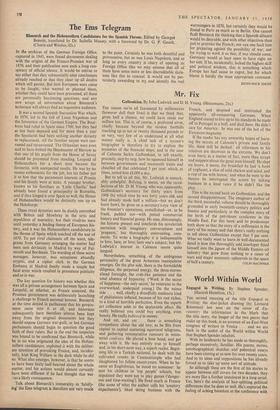The Ems Telegram
Bismarck and the Hohenzollern Candidature for the Spanish Throne. Edited by Georges Bonnin, translated by Dr. Isabella Massey, with a foreword by Dr. Q. P. Gooch. (Chatto and Windus, 42s.) IN the archives of the German Foreign Office, captured in 1945, were found documents dealing with the origins of the Franco-Prussian war of 1870, and their publication now ends a long con- spiracy of official silence. It would be untrue to say either that they substantially alter conclusions already reached or that they clear up all doubts which still persist. But how European wars come to be fought, who wanted or planned them, whether they could have been prevented, all these are perennially fascinating questions, and any new scraps of information about Bismarck's technique will always find an inquisitive audience.
It was a second Spanish Succession War which, in 1870, led to the fall of Louis Napoleon and the formation of the German Empire. The Bour- bons had ruled in Spain since 1700, but they had at last been deposed and for more than a year the Spaniards had been seeking another dynasty in replacement. All the familiar names were can- vassed and recanvassed. The Orleanists were even said to have bribed the Headmaster of Harrow so that one of his pupils from the House of Savoy should be preyented from standing. Leopold of Hohenzollern for a short time became the favourite, with unexpected results. He was by no means enthusiastic for the job, but his father put it to him that the paramount interests of,Prussia and his family were at stake. A younger brother, known to his familiars as 'Little Charlie,' had already been found a principality in Rumania, and if they kinged it over Spain as well, the House of Hohenzollern would be distinctly one up on the Habsburgs.
These royal dynasties now lie dustily entombed with Bohun and Mowbray in the urns and sepulchres of mortality; but their rivalries were until yesterday a leading theme of European his- tory, and it was the Hohenzollern candidature to the throne of Spain which touched off the war of 1870. To put rival claimants off the scent, tele- grams from Germany arranging the matter had been sent deviously to Madrid by way of Fal- mouth and Bordeaux. The wording of these secret messages, however, was sometimes absurdly cryptic, and a cipher clerk in the German Embassy at Madrid finally made a simple but fatal error which resulted in premature publicity and so in war.
The key question for history was whether this was all a private arrangement between Spain and Leopold, or whether, as France assumed, the Prussian government was deliberately launching a challenge to French national honour. Bismarck at the time denied in parliament that his govern- ment came into it at all, and historians subsequently have therefore always been kept away from the original documents lest they should expose German war-guilt, or lest German parliaments should begin to question the good faith of their rulers. But in the end the suspicion was bound to be confirmed that Bismarck, while he in no wise originated the idea of the Hohen- zollern candidature, exploited it with the deliber- ate intention of provoking France, and, inciden- tally, kept King William in the dark while he did so. What also emerges, however, is that he seems to have been fairly half-hearted about the whole matter, and his actions would almost certainly have been different if he had thought that war was a likely consequence.
Talk about Bismarck's immorality in 'falsify- ing' the Ems telegram is therefore not very much to the point. Certainly he was both deceitful and provocative, but so was Louis Napoleon, and so long as every country is chary of opening its Foreign Office files we may assume that all of them have some more or less discreditable skele- tons like this to conceal. It would not be par- ticularly rewarding to try and identify the real warmongers in 1870, but certainly they would be found in Paris as much as in Berlin. One cannot fault Bismarck for thinking that a Spanish alliance would be desirable, and with other objectives than just to provoke the French; nor can one fault him for preparing against the possibility of war; nor for trying to work it so that, if war should come, Germany would at least seem to have right on her side. If he, incidentally, lacked the highest skill and political wisdom, that is something which Europe has had cause to regret, but for which blame is hardly the most appropriate comment.
DENIS MACK SMITH






































 Previous page
Previous page